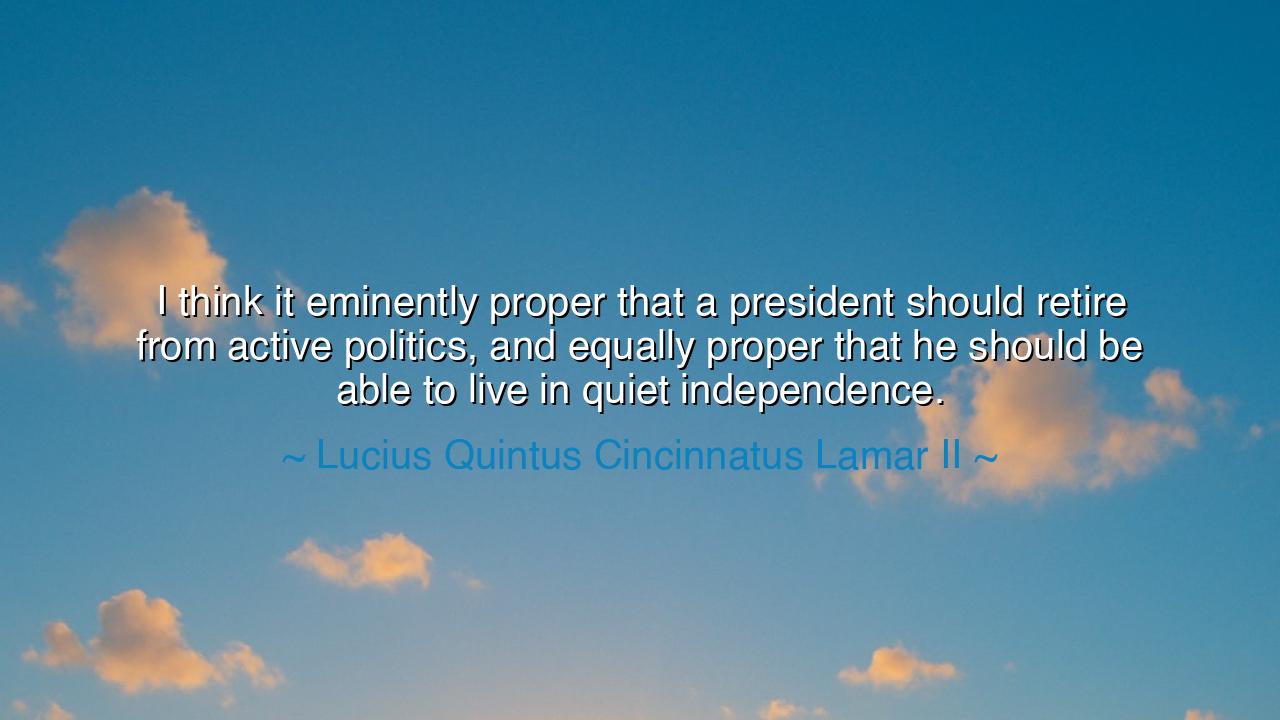
I think it eminently proper that a president should retire from
I think it eminently proper that a president should retire from active politics, and equally proper that he should be able to live in quiet independence.






There is dignity in power — but there is even greater dignity in relinquishing it. When Lucius Quintus Cincinnatus Lamar II declared, “I think it eminently proper that a president should retire from active politics, and equally proper that he should be able to live in quiet independence,” he spoke not only as a man of public service, but as a philosopher of restraint. His words breathe the wisdom of the ancients, who knew that leadership, when clung to too long, corrupts both the leader and the nation. Lamar’s sentiment calls us to a forgotten virtue: the grace of withdrawal, the nobility of stepping away from power when one’s work is done.
In this saying, we hear echoes of the Roman ideal embodied in Cincinnatus, the humble farmer-general from whom Lamar’s own name descended. When Rome faced peril, Cincinnatus left his plow to lead her armies. Yet once victory was secured, he laid down his authority and returned to his fields. He did not seek glory, wealth, or lifelong rule; he sought only to serve his duty, and then to live in quiet independence. This, Lamar understood, was the purest form of republican virtue — that power must be used as a tool of service, not as a throne of ambition. To retire from active politics is not to abandon one’s country, but to honor it by refusing to make oneself indispensable.
The presidency, in Lamar’s age as in ours, is both a crown and a burden. It is a station where the fires of ambition can easily consume the fires of conscience. Lamar, who served as a Confederate statesman, a U.S. congressman, and later as a Supreme Court Justice, witnessed firsthand how men can become prisoners of their own authority. His words warn against the sickness of those who cannot let go — who fear that without position, they cease to exist. To live in quiet independence after power is to prove that one’s worth was never bound to office, but to character.
History gives us noble examples of this virtue. When George Washington declined a third term as President, he astonished the monarchs of the world. He could have ruled America indefinitely, yet he chose to return to his farm at Mount Vernon. His farewell was not a retreat, but a teaching — that freedom survives only when leaders understand that public service has an end, and that private peace is not weakness but wisdom. Washington, like Cincinnatus, left behind not a dynasty, but a republic — a nation where power was meant to pass, not to linger. Lamar’s words revive that same principle: that a true leader governs best when he knows when to step aside.
But there is a second truth woven within Lamar’s reflection — that after such service, a leader must be free to live in independence, unbound by financial or political debt. Too often, those who serve their nation find themselves trapped by the very institutions they upheld. Lamar envisioned a society wise enough to allow its former leaders to rest with honor — neither puppets of influence nor beggars for livelihood. Independence, in this sense, is not mere solitude; it is the final reward of integrity, the peace that comes when a man owes nothing to power.
There is something profoundly human in this ideal. Every life, whether of kings or laborers, must pass from action to reflection, from the noise of ambition to the stillness of meaning. To retire well — to withdraw not in bitterness but in contentment — is a mark of maturity both for men and for civilizations. Lamar’s words remind us that the end of power should be as noble as its beginning, and that the final act of greatness is often silence.
So, my child, learn this from Lamar and from the ancients he honored: seek greatness, but do not cling to it. Serve your purpose fully, but know when to release it. The world is filled with those who grasp after relevance, who cannot bear to fade into peace. Be not like them. Instead, strive to build a life that, when its moment of service has passed, can rest in quiet independence, proud of deeds done and duties fulfilled. For the highest form of strength is not domination — it is the freedom to let go, and to live, at last, in the stillness of earned dignity.






AAdministratorAdministrator
Welcome, honored guests. Please leave a comment, we will respond soon